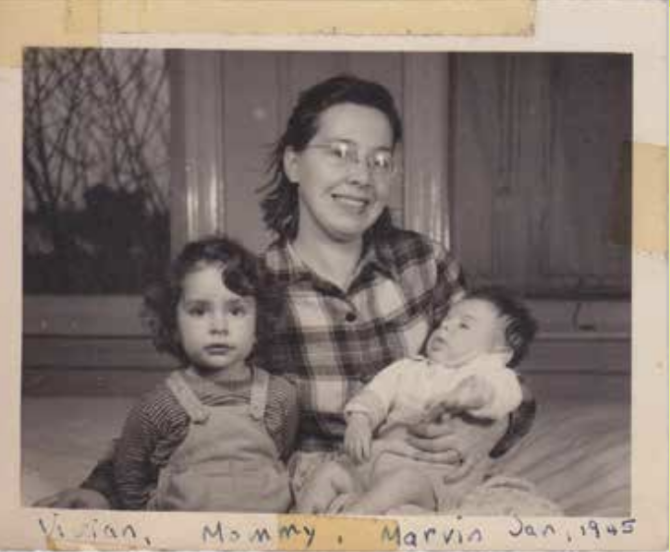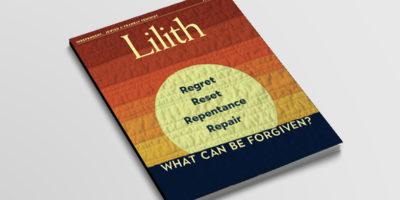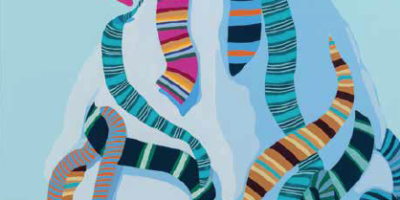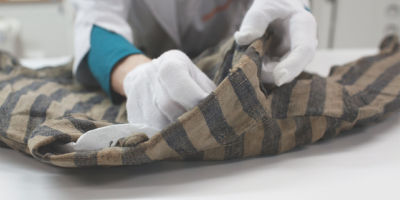
“Like A Worm You Poke With A Stick”
In third grade, I wrote a short story about a girl who lost her mother in a fire. When a policeman finally reunites them, the girl says, “We meet at last.” A lifetime later, after many ups and downs between us, my mother and I also met at last. I was in my sixties, she in her eighties, when she said, “It’s love at second sight.” This chapter from my memoir, Losing the Atmosphere: A Baffling Disorder, A Search for Help, and the Therapist Who Understood, shows how our complicated relationship began.
Nona fed us lunch the same way every day. White kerchief tied over the coiled gray braid at the nape of her neck, small gold earrings bouncing gently, and lips sucked in over toothless gums, she carried a delicious-smelling pot from the stove to the table. She dipped in a spoon and loaded it with a flavorful mush of potatoes, meat, tomatoes, and string beans. Holding her
hand under it to catch any spills, she brought it toward my face. I opened my mouth and she slipped it in. While I chewed, she refilled the spoon and ferried it to my cousin Jerry’s mouth. Next was my cousin George’s. If food dripped down our chins, Nona scraped it upward with the spoon and guided it into our mouths.
All the while, she told us stories. “De farmer, he work hard to plant ta vegetables,” she would begin. “He put water and take out alla ta weeds.”
My turn for the spoon.
“He no see de horse what come in de night to eat ta vegetables.”
Jerry’s turn.
“An’ he tink to himself, Why alla ta vegetables dey disappear lak dat? What’s happen?”
George’s turn.
“An’ he say, I gawn fine out who take ta vegetables.”
The farmer hid in the field with his gun. There was a loud BAMMM! Nona always timed it perfectly. Just as the horse was running away, spinach dangling from his mouth, the pot would be empty.
After we got up to play, Nona walked to the sink, swaying from side to side on her bowed legs, and washed the pot and spoon. She stopped at the stove to lift the lids from the supper pots and give a quick stir. Then she took my baby brother, Marvin, out of his playpen. Carrying him in her arms, she went back down to the basement to sew.
I loved staying in my grandparents’ house, where we had been living for the past three months, since my father left for the war. During the day, my mother and aunts were at work, and Papoo peddled aprons and pillowcases to housewives in Brighton Beach. Nona, the lone adult at home, sewed aprons and took care of the children. Sometimes we played in the backyard, sometimes in the basement, where we crawled in and out of the empty cartons next to Nona’s sewing machine and Marvin’s playpen, or climbed up the mountain of fabric scraps and slid down.
Though not yet three, I sensed that the rules were looser here in Brooklyn. When my parents and I had lived in Knickerbocker Village on the Lower East Side of Manhattan, I hadn’t been allowed to put anything into my mouth if someone else’s mouth had touched it. Germs. There had been no stories at the table. Most of the mealtime talk had been Spanish practice—if I
wanted bread and butter, I had to say, “Quiero pan y mantequilla, por favor”—or my father reading aloud to my mother from the newspaper. And punishment at Nona’s wasn’t really punishment. Once, when Jerry and I did something we weren’t supposed to, Aunt Mollie said, “You naughty children!” but she was smiling.
I would find out years later that my mother also felt freer away from my father’s control. When she had brought me home from the hospital as a newborn, he’d forbidden her to use baby talk with me. No coo-cooing. She was permitted to speak English, but he spoke to me only in Spanish. To him, I was a grownup in miniature, one step away from the harsh realities of the job world, and it would be useful if I knew another language.
My father had also appointed himself the guardian of my health. Every evening, he demanded a report from my mother. It was chilly out; did you put a sweater on her? How much milk did she drink? When I caught my first cold at nine months, he berated her. She hadn’t dressed me properly, he said, hadn’t opened the window wide enough when she put me to sleep. My mother said she began to feel like hired help.
My parents met in March, 1941, at a foreign-language conversation club in Manhattan. Both were first-generation Americans whose parents—hers, Jews from Greece and Turkey; his, Jews from Russia—had come to America through Ellis Island early in the century. Bea, my mother, whose husband of three years had divorced her, was 26. A graduate of Brooklyn College, where she had majored in French, she came to the club because someone told her it was a good place to meet men. My father, Jack, 32 and also divorced—he’d gone to Reno to end a four-year marriage—was a regular who spoke several languages. He was self-taught, having dropped out of high school to support his younger brother and two sisters when both his parents died of cancer.
Sometimes I imagine their meeting. Jack saw a pretty, soft-spoken woman with long brown hair combed into a stylish upsweep. Bea saw a serious, handsome man with dark curly hair and a mustache over full lips. Chatting in French, they told each other where they worked: she, sewing in a garment factory, the only job she could get in the lingering Depression; he, at the post office, where he used his linguistic proficiency inspecting customs declarations.
Their three-month courtship included many strolls along the Coney Island boardwalk. Bea was captivated because Jack liked classical music, studied languages, and played chess, but mostly because he showed an interest in her. She told me her self-esteem had been badly damaged by her divorce, and also that she wanted to be married again to please her mother. The fifth of nine children—eight of whom lived to adulthood—she knew, as did all seven girls, that Mama wished the best for them. The best was a husband. When Jack proposed one May evening on a long walk from Coney Island back to her family’s home on 74th Street in the Bensonhurst section of Brooklyn, she accepted. They were married by a Justice of the Peace on July 4, 1941. I was born ten months later, on May 7, 1942.
A month or so after my birth, my mother told me, she arrived home from grocery shopping to find my father giving me a bath in the kitchen sink. To her horror, after he lifted me out of the basin of warm water, he filled it with cold and plunged me in. “Warm water opens her pores,” he explained over my shrieks. “If you don’t close them right away, she’ll get sick.” After that, my mother bathed me herself, when my father wasn’t home.
Another day, sometime during my first six months, my mother’s younger sister Sophia came to visit. According to the routine my father had established, my mother put me into my
crib after my evening feeding and closed the bedroom door. She and Sophia were about to leave for the movies when I let out a piercing howl. My mother started toward the bedroom. My father blocked her way.
“If you go in,” he said, “she’ll learn that all she has to do to get her way is cry.”
“You know I don’t usually go in,” my mother said as my wails continued, “but this isn’t her normal cry.”
“Don’t interfere! Go to the movies with your sister!”
They returned several hours later to find my father playing chess against himself in a silent apartment. The incident was never discussed.
When I was two and a half, my father began to worry about being drafted. Until then, he had been exempt from military service because of an enlarged heart. Now, with the war raging in Europe and the Pacific, the Selective Service was calling up men who had previously been deferred. Rather than wait for their letter, which would almost certainly have meant being sent into combat, he used his typing, stenography, and language skills to secure a civilian position in the Army. He was to ship out at the end of October, but when he said his wife was expecting a baby soon, Army officials allowed him to wait a few weeks.
My brother, Marvin, was born on November 10, 1944. A week later, my father sailed for Italy, and my mother, Marvin, and I moved into Nona and Papoo’s house. Its four apartments were already occupied, some by family, some by other tenants, so we added ourselves to Nona and Papoo’s apartment. With our arrival, its three bedrooms were crammed with ten people, including Aunt Mollie, whose husband was also in the war; her one-year-old son, my cousin Jerry; and my unmarried aunts, Rae, Sophia, and Diana.
In the beginning of my parents’ marriage, my mother had deposited her factory salary into their joint checking account, but after she made a small purchase without asking my father beforehand, he’d taken her name off the account. Now, with Nona caring for Marvin and me, my mother found a job as a substitute teacher at P.S. 128, a ten- minute walk away, and opened her own bank account. She also passed the Board of Ed test to become a permanent teacher and, in February, three months after our move to Brooklyn, was offered a fifth-grade class at P.S. 54 in Bedford-Stuyvesant, much farther away. She accepted, even though it meant she would get home more than an hour later.
At about the same time, Aunt Sarah and Uncle Sam, who also lived in the 74th Street house, told my mother about a vacant apartment around the corner, above a dry goods store on 20th Avenue. Though hesitant to move out on her own with two children, my mother liked the idea of having privacy and went to look at it. The small living room and bedroom faced the back. It was winter—no leaves on the trees—and she could see the fences and clotheslines in all the backyards of the houses on 74th Street, right down to Nona’s. She decided to take it.
I was miserable at my sudden banishment—from Nona, my aunts, my cousins. On 74th Street, if one grownup was busy, another was glad to pay attention to me. Here, there was just my mother, who was always busy. “I’ll look at it later,” she said if I tried to show her a drawing.
Every morning while she dressed Marvin, I dressed myself. Then I asked her to tie my shoelaces. “I’ll be happy when you learn to tie them yourself,” she would say in an annoyed voice. “Hold still!” After we dropped Marvin off at Nona’s, she and I walked to the JCH—Jewish Community House—on Bay Parkway, where she had enrolled me in nursery school.
My mother was rushed when she picked me up in the afternoon, too. “That’s lovely,” she would say, tucking my painting into her bag. “Now get your hat.” We walked the quarter mile
to Nona’s. Still in our coats, we hurried through the upstairs hall and down the side steps to the basement, where my mother lifted Marvin out of his playpen.
Back home, she peeled potatoes and cooked lamb chops and canned peas, washed the dishes, wrote lesson plans, cleaned the bathroom, and darned socks. She hardly smiled anymore. Marvin was too young to play with, so I amused myself, either indoors or on the sidewalk in front of the dry goods store owned by our landlady, Mrs. Feigenbaum. Sometimes I asked permission to walk around the corner to Nona’s. My mother usually said yes and might add, “Tell Nona I’ll be over in a half hour to use the washing machine.”
I was invariably cheerful at Nona’s, where I got lots of love and attention, but with my mother I began to whine.
“Mah-meee, I can’t find my sweeeater,” I complained one morning.
She stormed into the bedroom in her suit and her new short haircut that I was still getting used to—“I have no time for long hair,” she said soon after we moved—and pulled out all the dresser drawers. “Here!” She flung the sweater onto my cot. Feeling like a worm you poke with a stick, I put it on quickly so we could leave.
Spring came, and the two trees in Mrs. Feigenbaum’s back- yard burst into flowers that pushed against our windows like pink ruffles. “They’re cherry trees,” my mother said, smiling. She opened a window, glanced down to make sure Mrs. Feigenbaum wasn’t in the backyard, and leaned out over the clothesline to cut some branches.
“Aren’t they beautiful?” she asked.
I wasn’t sure she was talking to me, but I said yes just in case. In May, days before my third birthday, a package arrived for me from Europe. My mother and I opened it to find the smallest record I had ever seen.
“Hello, Viv. This is Daddy, talking to you from across the ocean in Italy.” The voice on the Victrola was scratchy, but unmistakably my father’s. “Do you remember how I used to lift you high in the air and say, ‘Uno, dos, tres, arreeeeeba’? And do you remember how you didn’t want to go to sleep when I put you back down in your crib, and you used to say, ‘No quiero dormir’?” I did remember.
Soon afterward, on a day my mother was particularly annoyed at me, I said, “Why don’t you pack me in a carton and mail me to Daddy?”
My mother smiled, then said, in her teacher voice, “That wouldn’t work, because when they sealed the carton, there wouldn’t be enough air for you to breathe. You can never send living things through the mail.” It made sense.
“Mah-meee, my legs hurt,” I whined as I trudged alongside her one day, holding the handlebar of Marvin’s stroller while we walked for what seemed like miles. To the dry cleaners on 75th Street. The grocery store on 73rd Street. The shoe store on Bay Parkway. “When are we going home?”
She stopped suddenly and slapped my face. “Get out of my sight, you fucking bastard! Go shit in your hat! Your name is mud!”
When she screamed like that at home, I went to my room to color until she was in a good mood again. How could I get out of her sight here, when I had to hold onto the stroller?
We kept walking, in silence now, looking straight ahead, so I couldn’t see her face. But our hands were holding the same handlebar. I felt her loathing seep through it and into me, circulating in my veins. For a minute, I felt like the worm you poke with a stick again. Then a picture came into my head of a silly man taking off his homburg, placing it upside down on the sidewalk like a pot, and squatting over it to have a bowel movement. I laughed out loud. A moment later, I stopped laughing and began sucking the thumb on my free hand. After that day, the picture of the squatting, shitting man came
to me whenever my mother screamed, “Go shit in your hat!” I always laughed, even when she slapped me.
It was as if I had two mommies: a love mommy and a hate mommy. The one who loved me hung my paintings on the wall. She let me lean against her when she read my Little Golden Books on her bed in the living room and gave me orange slices to suck when I was sick and threw up, to take away the bad taste. When the mommy who loved me was there, I didn’t know about the mommy who hated me, and when the mommy who hated me was there, I didn’t know about the mommy who loved me.
Finding it increasingly difficult to balance work and motherhood, my mother applied for maternity leave when the school year ended in June. The Board of Ed denied her request. Leave was for new mothers only, they said. Marvin was eight months old. Seeing no other option, she quit, even though the principal wanted her to stay and leaving meant she would lose her permanent license. Her plan was to look for a substitute job closer to home in September.
With the summer off, my mother was more relaxed and didn’t scream as much. Almost every day, she tucked a pail and shovel, a towel, and my bathing suit into the stroller alongside Marvin for the three-block walk to Seth Low Park. Often my cousin George came, too. My mother would read on a bench while we played in the sandbox or cooled off under the sprinkler in the wading pool. Sometimes I could even get her to push me on the swings.
She did find a substitute job in September, teaching English at Seth Low Junior High, and I went back to nursery school.
Then, in November, exactly a year after he had gone, my father wrote to say he was coming home from the war. His ship would be sailing into Newport News, Virginia, and from there
he would find a train or bus to New York.
We were all at Nona’s one afternoon when an upstairs tenant came rushing in and said, “I just saw your husband walking on Twentieth Avenue!”
“Go! Quick!” Nona urged my mother. “So you be there before him to say hello.”
Vivian Conan is a writer, librarian and IT business analyst who lives in Manhattan. Losing the Atmosphere: A Baffling Disorder, A Search for Help, and the Therapist Who Understood is her first book.




